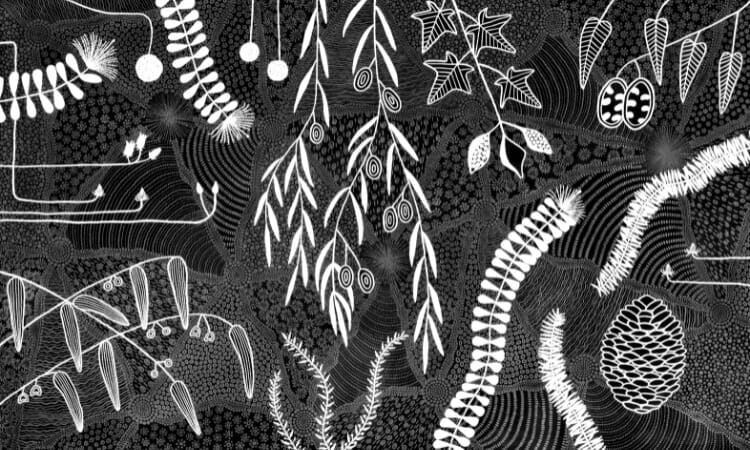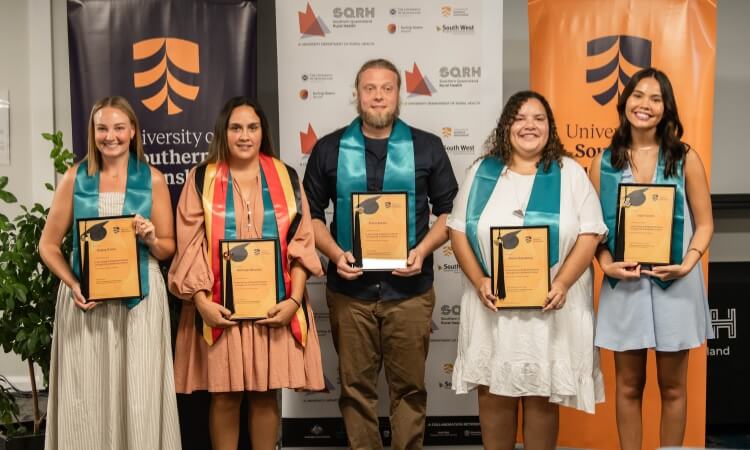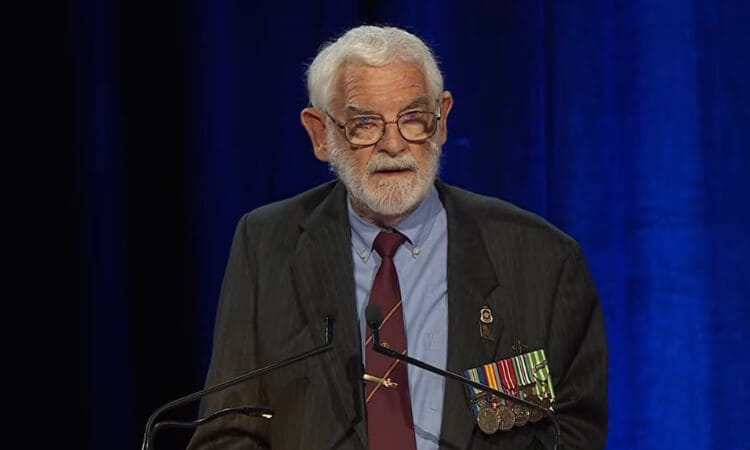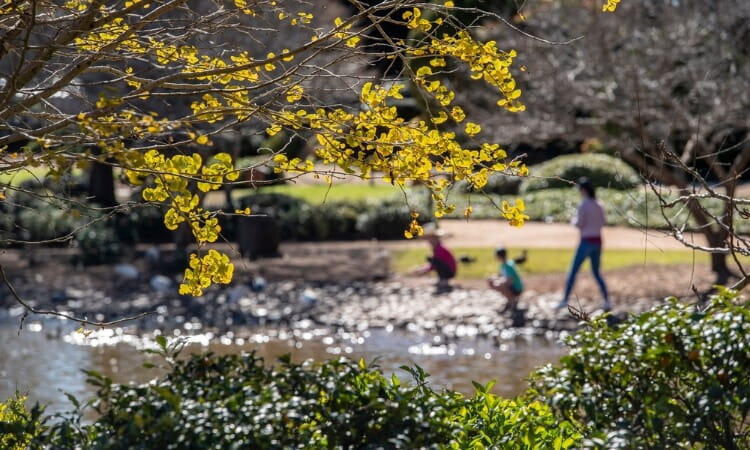Healing with heart and heritage: Meet the UniSQ nursing grad paving the way for First Nations communities

Sharna Dodd’s story is one of incredible resilience, courage, and dedication.
She was six months away from finishing her Bachelor of Nursing when life threw her a curveball. She was prepared to walk away – for the third time.
Fortunately, support from the University of Southern Queensland (UniSQ) came at the right time and she was able to see her dream through.
More than a decade on from graduating with a Bachelor of Nursing, she can still recall the journey as if it was yesterday.
Now working at Metro North Hospital and Health Service, she is using her voice and passion for healthcare to improve outcomes for Aboriginal and Torres Strait Islander patients.
As we mark National Reconciliation Week (26 May – 3 June), Sharna shares how her love of nursing, lived experiences and determination to create change are shaping a stronger future for her community.
What was your university experience and how did it prepare you for your career?
I really enjoyed completing a Tertiary Preparation Program course at Kumbari (now known as UniSQ’s College for First Nations). It was through this program that I formed meaningful connections, many of which carried through into my Bachelor of Nursing. These connections have remained strong and continue to support me today in my nursing career. As I’ve worked across Queensland, I often cross paths with people I started this journey with, which highlights just how valuable those early relationships were in shaping my personal and professional growth.
Were there any specific courses or professors that had a lasting impact on your career path?
Yes, Dr Lynne Stewart had a profound impact on my journey. I returned home for a few years for personal and family reasons and during that time, I was working as an Assistant in Nursing. Lynne took the time to check in on past students and sent a letter to my workplace, encouraging me to return to UniSQ and complete my degree. That one act of kindness and belief in my potential gave me the confidence to go back – and ultimately changed the course of both my life and career.
How did you balance academics, extracurricular activities and personal life during your time at university?
Initially, it was quite challenging. I was working full time while also attending university so trying to balance work, study and placements was difficult. What really helped was the support I received from the College for First Nations. I appreciated that it was accessible after hours and on weekends, which gave me the flexibility I needed. Being able to attend during those times made a big difference and helped me manage the demands of my schedule more effectively.
Can you share any pivotal moments during your university years that helped define your professional journey?
When my brother passed away, UniSQ offered incredible support at a time when I needed it most. I was six months away from finishing my degree and I was prepared to drop out (for the third time). Instead, they helped me organise my placements back home in Mitchell, which allowed me to stay on Country with my family during such a difficult period.
Being able to complete my studies externally made a huge difference. Without that option, I honestly don’t think I would have finished my degree. I’m not sure larger universities would have provided the same level of personalised support.
Were there any challenges you faced during university, and how did you overcome them to get to where you are now?
Homesickness was one of my biggest challenges, it was the first time I had ever left home. Coming from a small country town, being away from my family was really difficult. I think that’s part of the reason I ended up going to university twice. I dropped out the first time but eventually returned.
Learning to be independent through that experience gave me the confidence I needed after graduation. It helped prepare me for my graduate year on Thursday Island, an even bigger move – and much further from home than Toowoomba was from Mitchell. University taught me that I could do things on my own, and it gave me the life skills I needed to take that next step.
What advice would you give to current students who want to achieve similar success in their future?
Always keep your options open. The beauty of a career in nursing is there are so many different pathways you can take. Just because you don’t enjoy working in the emergency department doesn’t mean you won’t enjoy nursing, there are other spaces. Whether it’s community or rural and remote or even research, there’s just so much freedom and so many different avenues you can take. Always be open to new opportunities and don’t be afraid to challenge yourself. You never know, it might just be the best experience of your life.
What do you wish you had known when you were in university that might have helped you in your career today?
You can’t learn everything from a textbook. Life skills matter.
Can you describe your current role and the main responsibilities you handle?
I currently sit within a strategic team – we look at system changes and process changes to try and improve health outcomes for Aboriginal and Torres Strait Islander patients within Metro North.
What are you working on now, and how did your university background prepare you for your current projects or role?
I am currently the Acting Director of First Nations Women, Children and Families at Metro North within the Aboriginal and Torres Strait Islander Leadership Team. It’s a step away from my substantive position. University taught me how to navigate new and challenging experiences. When you first start university, everything feels unfamiliar and uncomfortable – but if you embrace that discomfort, the possibilities are endless. That mindset has stayed with me and prepared me to step into this leadership role with confidence, even when things feel uncertain.
How did you end up in your current position?
About five years ago, I ran into Sherry Holzapfel – a First Nations woman I studied with during my first stint at UniSQ. While I had dropped out, she graduated with that cohort and is now the Executive Director for Aboriginal and Torres Strait Islander Health at Metro North. At the time, I was working in the emergency department at The Prince Charles Hospital. It was one of those, “Hey, what are you doing here?” moments. We had a good yarn, and during that conversation, she said, “If you’re ever looking to get into the First Nations health space, reach out.”
Not long after, someone sent me a job they thought I might be interested in. I reached out to Sherry and that was about five years ago. Funnily enough, Sherry is my current Executive Director and is also a UniSQ First Nations Alumni.
What do you enjoy most about your current career? What aspects do you find most challenging?
No two days are ever the same and I love that about nursing. There is never an opportunity to get bored and there is always an opportunity to learn.
What I find challenging is the speed at which system change occurs. In relation to First Nations health, we’re talking about generational trauma and damage. We can’t undo that overnight. I find it challenging having to be patient. A significant and meaningful change that will undo the historical damage that has occurred to Aboriginal and Torres Strait Islander people won’t happen instantly, it’s a process.
What have been some of your proudest achievements or most rewarding projects in your current job?
On a personal level, one of my proudest achievements was completing the Metro North Health Executive Leadership Program last year. It was a transformative experience that helped me grow both professionally and personally, particularly in developing my leadership capabilities. That program helped me to prepare and become equipped to drive meaningful change for First Nations people.
As for the most rewarding project I’ve been part of, I would say it’s the work I’m doing right now. We’re currently in the process of launching the 2025–2028 Metro North Health Equity Strategy. I wasn’t involved in the development of the previous strategy as I joined after it had already been implemented, so being part of this process from the ground up has been incredibly meaningful. Having the opportunity to help shape a strategy that amplifies community voices and creates real impact for our First Nations communities is something I’m truly proud of.
How do you maintain a work-life balance and what strategies do you use to avoid burnout?
Throughout my nursing career, I’ve always made self-care a priority. Taking care of myself helps me stay grounded and maintain balance. I enjoy things like facials and massages as they give me the chance to unwind, switch off from work and recharge. I also love walking along the waterfront at Sandgate. As cliché as it might sound, reconnecting with nature really helps clear my mind.
Recently, I’ve also returned to the gym which has become a great outlet for both physical and mental wellbeing. Sharing that time with my younger sister has made it even more enjoyable. It’s been an effective way to maintain a healthy work-life balance and stay present in both my personal and professional life.
What advice would you give someone who is interested in pursuing a career similar to yours?
Go for it. Nursing has opened so many doors and opportunities for me. While I haven’t done much travel outside of Australia, I’ve been fortunate to visit places like Thursday Island and explore some truly beautiful parts of the country. Over the years, I’ve formed incredible friendships and genuine connections. Nursing can be a heavy and emotionally intense space at times, so the bonds you build with others tend to be deep and lasting.
Sometimes I had to pinch myself to believe it was real. I remember one moment in particular when I was working remotely in the rainforest doing dressings and a peacock emerged from the bushes. It was surreal, and I couldn’t help but think, “Is this really happening?”. The opportunities and experiences this career offers are truly endless – and often, nothing short of incredible.
How do you handle setbacks or challenges at work, and how do you stay focused on long term goals?
Our work in the strategic space is largely focused on long term goals and that’s where our attention needs to stay. I’m someone who can hold that long view, and I believe it’s essential that we give ourselves the time to properly research, plan and figure out how to get things right. Too often, things go wrong because we haven’t done the groundwork or taken the time to think things through.
Healthcare as a system is inherently reactive. We’re constantly needing to pivot, sometimes because of external pressures, other times due to internal shifts. That makes it challenging to stay focused. But if you stay grounded in the right reasons, why you’re there in the first place, you can keep coming back to your purpose. For me, that purpose is about improving health outcomes and the health journey for First Nations people.
I’ve seen the system from both sides. As a clinician on the floor, I’ve witnessed how people are treated. I’ve also seen it as a family member and in both cases, I’ve seen care that’s unacceptable treatment no one should ever have to experience. That’s why staying true to our purpose matters. It’s what keeps us focused and aligned with the impact we’re trying to make.
Learn more about Nursing at UniSQ.


